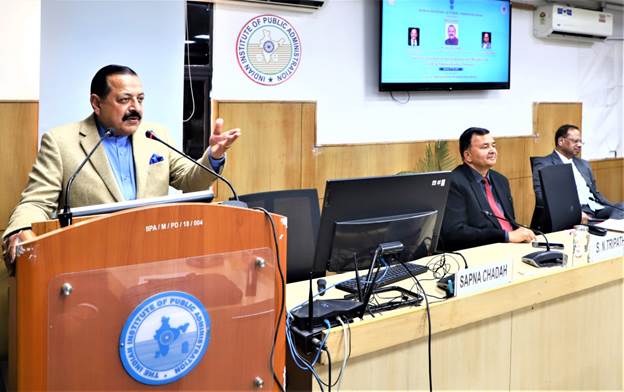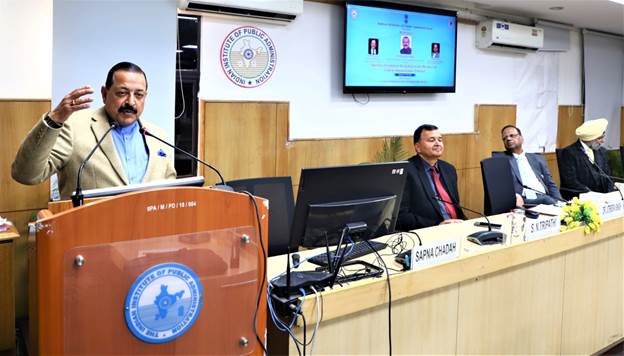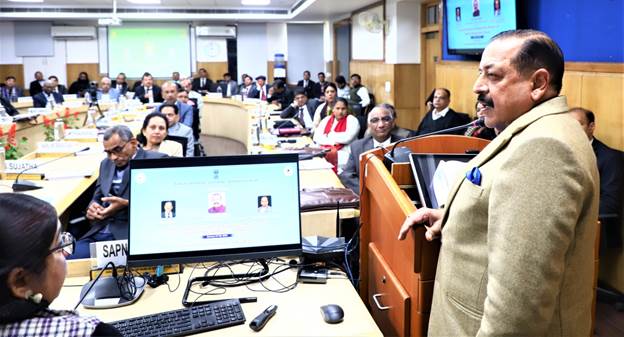Ministry of Personnel, Public Grievances & Pensions
Union Minister Dr. Jitendra Singh says, under Prime Minister Shri Narendra Modi’s leadership, the Government is constantly removing bottlenecks for faster disposal of litigations in the Central Administrative Tribunal, across the country.
Dr. Singh addresses two-day Orientation Workshop for the Members of Central Administrative Tribunal at Indian Institute of Public Administration (IIPA) in New Delhi today
The Government, in last 8 years, has repealed around 2 thousand laws which have become obsolete, says, Dr. Jitendra Singh
प्रविष्टि तिथि:
27 JAN 2023 6:13PM by PIB Delhi
Union Minister of State (Independent Charge) Science & Technology; Minister of State (Independent Charge) Earth Sciences; MoS PMO, Personnel, Public Grievances, Pensions, Atomic Energy and Space, Dr Jitendra Singh today said that under Prime Minister Shri Narendra Modi’s leadership, the Government is constantly removing bottlenecks for faster disposal of litigations in Central Administrative Tribunal, across the country.
While addressing, the two-day Orientation Workshop for the Members of Central Administrative Tribunal at Indian Institute of Public Administration (IIPA) in New Delhi today, Dr. Jitendra Singh, who is also the Chairman, IIPA Executive Council, said that the Government, in last 8 years, has repealed around 2 thousand laws which had become obsolete. He said that the Government has looked forward and made efforts to reduce the burden of the judiciary by simplifying procedures and removing hurdles.

Dr. Jitendra Singh also launched the Namani Gange Calendar on the occasion. Chairman, Central Administrative Tribunal, Justice Ranjit Vasantrao More, Smt. Rashmi Chowdhary, Additional Secretary, DoPT, Shri SN Tripathi, IIPA and several other senior officials were present on the occasion.
Dr. Jitendra Singh said that while conceptualising idea of Central Administrative Tribunal (CAT), it was expected that the setting up of such Administrative Tribunals to deal exclusively with service matters would go a long way in not only reducing the burden of the various Courts and thereby giving them more time to deal with other cases expeditiously but would also provide to the persons covered by the Administrative Tribunals speedy relief in respect of their grievances. He said that Parliament enacted Article 323A to provide for special Tribunals for the purpose of hearing specialized matters like service matters on two grounds, first, that the High Court is so much burdened with other types of works and, therefore, it is not possible for it to expeditiously dispose of service matters. And, second, that the service matters need an amount of specialization and, therefore, an element of experience of service matters is necessary

The Union Minister said that with the increasing pendency of litigation before the High Courts, the theory of ‘alternative institutional mechanisms’ has also been propounded to defend the establishment of Administrative Tribunals. He noted that these Administrative Tribunals are expected to function as a viable substitute for the High Courts.
Dr. Jitendra Singh said that the Administrative Tribunals are distinguishable from the ordinary courts with regard to their jurisdiction and procedure, as they exercise jurisdiction only in relation to the service matters of the litigants covered by the Act. He stated that these Tribunals are also free from many of the procedural technicalities of the ordinary courts. Dr. Singh said that the Tribunal is thus now manned by persons having vast experience in judiciary and administration, resulting not only into quick disposal of cases, but quality judgments as well. He appreciated the fact that these Members are discharging their duties similarly as are being discharged by higher judiciary in the country, independently of government intervention and the Chairman of the Tribunal can be given powers akin to that of Chief Justice of a High Court.

The Central Administrative Tribunal (CAT) was set up on 01.11.1985 with Benches at five places. As on date, it has 19 regular Benches, 17 of which operate at the principal seats of High Courts and the remaining two at Jaipur and Lucknow. Both the newly created Benches at Jammu and Srinagar have been made functional. The Jammu Bench was made functional w.e.f. 08.06.2020 and the Srinagar Bench has recently been made functional w.e.f. 23.11.2021. Dr. Singh noted with satisfaction that since its inception in 1985 and up to 30.11.2022, 8,93,705 cases have been received in CAT for adjudication (including those transferred from High Courts), out of which 8,12,806 cases have been disposed of, leaving a pendency of 80,899 cases. He noted that the disposal rate by CAT, on an average, has been above 90%. He said that there is no doubt that the Central Administrative Tribunal has come a long way and is rightly being characterised by the uniqueness in its jurisdiction and procedure. Freedom from the long drawn mandatory procedural technicalities has enabled it to achieve an unmatched disposal rate.
On the issue of delay, which continues to affect the system in the matter of resolution of service disputes, Dr. Singh said that it has been generally noted that the disposal of the applications before the Administrative Tribunal always has been expeditious and hardly there is pendency of old cases in most of the Benches.
Dr. Jitendra Singh noted that technological interventions play a primary role in mitigating the impact of COVID-19 and delivery of services to people. He said that the delivery of the justice and functioning of court was also achieved to a certain extent due to the facility of e-courts and video-conferencing facilities, very well envisaged by the Prime Minister Shri Narendra Modi. He said that technological intervention in case management and disposal (e-filing, e-evidence, Video-conferencing and online case management system) need to be adopted and implemented more rigorously.
*****
SNC / RR
(रिलीज़ आईडी: 1894164)
आगंतुक पटल : 1450